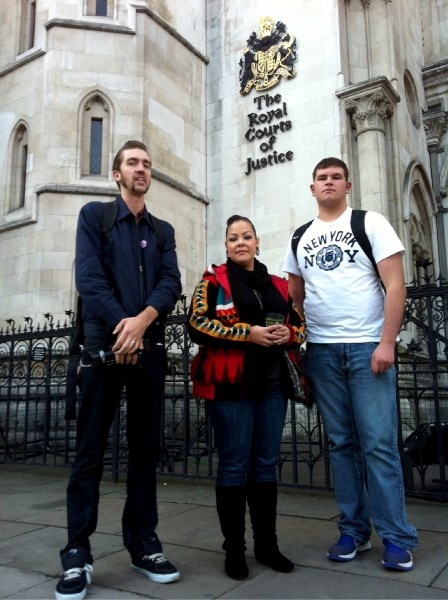Two members of Beaver Lake Cree Nation recently travelled to the United Kingdom to talk about the impacts of oilsands developments on their lives and community.
Crystal Lameman, 29, and Chance McPherson, 18, were in the U.K. Nov. 9–15 as part of an exchange with U.K.-based environmental group People & Planet – who sent a group of youth to the Lac La Biche area this summer to visit BLCN and learn more about Alberta`s oilsands.
With financial support from People & Planet, Lameman and McPherson spent the week speaking to student groups, government officials, and visiting activists around the country.
“We went to ensure that current plans to quadruple tar sands expansion are halted,” said Lameman, a mother of two who is working towards her second degree at the University of Alberta. “It’s been scientifically proven that it’s affected all of northeast Alberta, not just First Nations.”
While there, they spoke in London, Oxford, and Birmingham, addressing crowds of hundreds at universities and environmental rallies. They had planned to speak to U.K. Minister of Transportation Norman Baker, but had to settle for two civil servants from the department. Baker is a key part of England’s vote on the European Union’s Fuel Quality Directive – an initiative that could potentially label oilsands crude as a dirtier fuel source than conventional oil.
“It’s really sad how often the First Nations have to travel across the ocean to get attention in Canada,” said Liam Barrington-Bush, the tar sands campaign organizer for People & Planet.
He said their visit was a success – despite not being able to speak to the transportation minister. What makes the situation frustrating is the open access Canadian officials have to high-ranking U.K. policy-makers, Barrington-Bush said. U.K.-based newspaper The Guardian recently reported that top-level British cabinet ministers have had 15 meetings with Canadian lobbying groups since September.
“The U.K. and Canadian governments are having this back and forth, trying to sell the tar sands,” Lameman said.
“I’m here because they forgot to mention our story. We all have a family to feed; we can’t pretend we don’t. But we don’t have to accept that we’re treated unfairly.”
McPherson, like Lameman, stressed he doesn’t advocate shutting down the oilsands entirely. They both said increased consultation with oil and gas companies and the government would go a long way to ensuring development could continue without disastrous effects to their land and traditional way of life.
“In the U.K., they view the tar sands as environmentally damaging – but back home, it’s a source of jobs and income,” said McPherson, a student at J. A. Williams High School. “My father is working up in a camp right now; he’s worked in oil forever.”
He said it was an internal battle whether or not to go, given that his family – and many other families in the area – rely on the oilsands for their livelihood.
“What made me finally go was that we’re going to run out of oil eventually – we should stop the growing pains now,” McPherson said. “We can slow it down to the point where the environmental effects don’t hurt everything and everybody around us.”
In 2008, BLCN filed a lawsuit against the governments of Alberta and Canada in an attempt to slow oil and gas expansion throughout their traditional territories by Lac La Biche County. Environmental groups in the U.K. have offered support to the local First Nations, including People & Planet and The Co-operative – a bank that has contributed $400,000 towards BLCN’s legal fees.
The first hearing for the case is expected in early 2012. Until then, Lameman wants to continue spreading the message that while oil is important to the economy, it doesn’t trump the basic human rights of clean air and water.
“I went to tell the truth – my truth,” she said. “My ultimate goal is to have open, honest consultation. That’s all we’re asking for, not just being approached when the ink is almost on the paper. It’s such a huge industry, such a huge part of our lives – but we can’t eat the money and we can’t drink the oil.”



